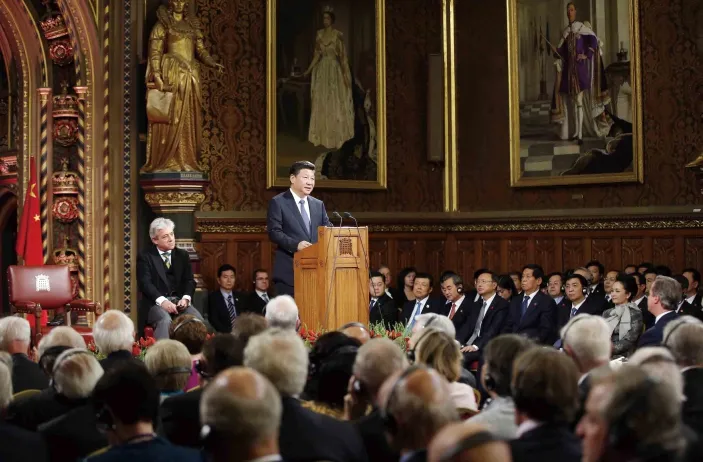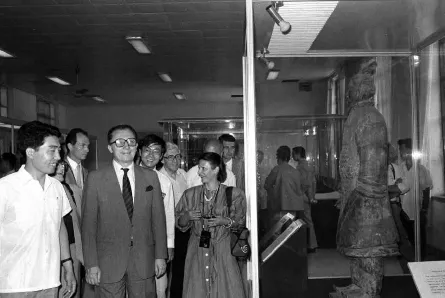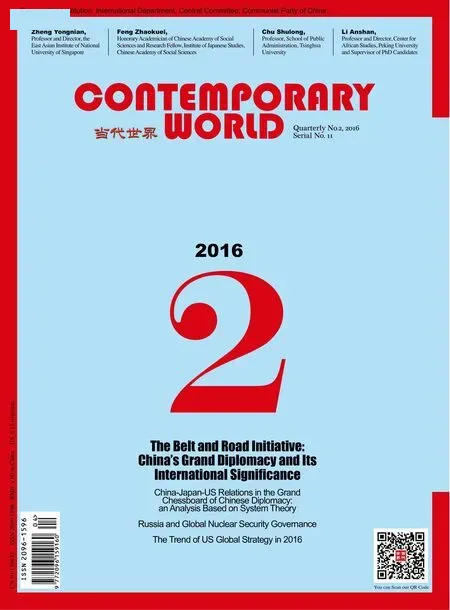Comprehensively Upgraded China-EU Relations Takes Early Shape
2016-11-23ZHoUHonG
ZHoU HonG
Academician of Chinese Academy of Social Sciences and Deputy Director-General of Academic Division of International Studies of Chinese Academy of Social Sciences
Comprehensively Upgraded China-EU Relations Takes Early Shape
ZHoU HonG
Academician of Chinese Academy of Social Sciences and Deputy Director-General of Academic Division of International Studies of Chinese Academy of Social Sciences

Chinese President Xi Jinping's visit to Britain ushered the Sino-British relationship into a golden era,and the bilateral relationship plays an exemplary role for the further growth of Sino-European relationship. The picture shows on October 20, 2015,Xi Jinping delivers a speech at the British Parliament.
The year of 2015 marks the 40th anniversary of the establishment of diplomatic relations between China and the European Union (European Community). Looking back to the process of development of China-EU relations over the past forty years, the main theme of expanding cooperation for common development has run throughout. Looking into the future, the posture of developing the relations for win-win cooperation and strategic interdependence on even larger scale,to more profound degree and on higher level has taken shape. China-EU relations are not only especially important in China's diplomatic pattern that is progressing in an allround way and proactive in essence,both being unique in character and very active. As the EU sustains multiple troubles of the Euro debt crisis, the Ukrainian predicaments,the migrant crisis and the incidence of terrorist attacks and as China undergoes the “economic new normal” and is at the crucial juncture of industrial restructuring, to actively push forward and to accelerate the upgrading of China-EU relations is not only good news for the development of China and the EU but also provides dynamics and experience for peace and development of the world at large. To take the stock of China-EU relations in 2015, one can see remarkable bright spots.

The year of 2015 marks the 40th anniversary of the establishment of diplomatic relations between China and the European Union(European Community). The picture shows that the then Chairman of the European Community Jaques Delors visited Xi'an on July 4, 1986.
STRUcTURAL UPGRADInG HAPPEns In MULTI-TIER CooPERATIon
The past forty years has witnessed development of cooperation in multiple fields of China-EU relations. For eleven years running, the EU has been the largest trading partner of China and for twelve years running, China has been the second largest trading partner of the EU. Trade volume between the two sides has continued to increase and approach the set goal of US $ 1 trillion by 2020.
As trade volume grows, trade structure between China and the EU has seen upgrading from the original trade in goods gradually developing to cooperation in high-end technology,cooperation in services and cooperation in investment. China's industrial restructuring has led to China-EU trade transformation and upgrading towards trade in service and green economy. China's Belt and Road strategic conception and the 13th Five-YearPlan go side by side withEurope's Plan for Strategic Investments (the Juncker Plan). As the development goal of Made in China 2050 is highly identical with that of German Industry 4.0,New Industrial France and Made in UK 2050, the opportunity and effects of strategic interface and complementarity between the two sides greatly increase. In 2015, on the basis of China-Europe Strategic Plan for Cooperation 2020, China-EU economic cooperationwas once more upgraded, marked by China's equity participationin the Juncker Plan, the Silk Road Fund investing in European Bank for Reconstruction and Development, the issuance of the RMB sovereignty bonds in Europe, the EU countries' participation in the Asian Infrastructural Investment Bank (AIIB) and support for the entry of RMB in SDR basket. The fact that China-EU economic relations continue to accelerate, rise up and deepen, on the one hand helps economic growth and job creation of the EU, and on the other contributes to China's economic miracle that attracts the world's attention, making China and the EU “growth partners” in name and in fact that are “inseparable like clouds becoming rain”.
The strong and dynamic economic relations between the two sides have kept pushing the development of China-EU relations towards partnership in multi-tier cooperation. In the past forty years, China and the EU have moved from trading partners to comprehensive strategic partners,and construction ofplatformsof exchange, dialogue, communication and cooperationbetween the two sideshas expanded to more than seventy areas,including mechanisms for regular communication and consultation on national and local government levels,promoting policy coordination and mutual learning on reform, helping facilitate economic and trade activities and cooperation in technological innovation and investment, and enhancing exchanges and mutual understanding between political parties and social organizations. Between China and the EU, multi-field and multi-tier direct exchanges happen, channels being unprecedentedly smooth and movement of people becoming increasingly frequent. There are 300,000 Chinese students studying in Europe. Movement of people between China and the EU reaches 6 million person times per year, far surpassing that between China and any other country and region.
MAInsTREAM OPInIon QUIETLY CHAnGEs
In 2013, when calling on the EU,President Xi Jinping described China-EU relations as four partnerships for peace, growth, reform and civilization,aiming to redefine and reposition the bilateral relationship. This new definition has repositioned China-EU relations in an all-round way, leading to the change in traditional views and mindset on the relationship that turns about the phenomenon of concepts detaching from the fact, reverses the negative, ossified way of thinking, and stimulates positive search for commonality and constructive thinking and exploration. It has resulted in a quiet change in opinion on China-EU relations
In 2015, as President Xi stressed on the four partnerships on a number of occasions and as concerned circles in China and Europe searched for new possibilities for further cooperation between the two sides from the angles of peace, growth, reform and civilization,the concept of contest and hedging began gradually to give way to that of inclusiveness and win-win situation. The standard of “cooperation, innovation and practice” has been erected in practical cooperation, the slogan of“green practice” becoming the order of the day. In academic exchanges,practical issues like “economic development, building the rule of law and evolution of society” are under discussion. At conferences on the internet,ways of digital economic cooperation like “communication, cooperation and mutual trust” become focus of exploration. From China, there arescheduled freight trains such as “Chongqing-Xinjiang-Europe”, “Zhengzhou-Europe” and “Wuhan-Europe” rushing to the fore to deliver goods to Europe. China's longing for peace and aspirations for development have been met with positive responses from various quarters in the EU.
CooPERATIon MEcHAnIsMs Un-DERGo InnoVATIVE REsTRUcTURInG
In the mainstay of win-win cooperation and under the circumstances of various quarterspromoting development of cooperation, cooperation mechanisms between China and the EU undergo new restructuring.
In June 2015, Premier Li Keqiang spoke at China-EU Business Summit and expressed China's ability and willingness to participate in the Juncker Plan, vowing to support capable and credible Chinese companies to partake in transport infrastructural projects such as construction of European transport network, China-Europe land-Sea Express Line, new Asian continen-tal land bridge and at the same time to welcome European companies to participate in the Belt and Road construction and to share the platform of connectivity. In barely three months afterward, a joint China-EU working group was set up and experts from China and Europe began to discuss mode of joint work and concrete projects for cooperative development, jointly establishing a platform for cooperation in connectivity. The EU has also set up a transparent digital platform for investment projects. European Investment Project Portal (EIPP), which collects current and future investment project in the EU, provides information on all concerned projects, opens to European,Chinese and other investors in the hope to help inject new vitality to the world economy.
On multilateral level,the establishment of the AIIB has brought about an opportunity for China, the EU and all other founding member countries to share fruits in joint construction. The rule building of the AIIB has absorbed multiple interest and plans of many countries and collected wisdom and strength from various countries, enabling the governance of the AIIB to become a supernational mechanism of multilateral governance, amechanism that reflects common interest and shared destiny of the mankind.
THE GEnERAL PUBLIc AnD EnTERPRIsEs BEcoME MAIn DRIVInG FoRcEs oF CHInA-EU RELATIons
In 2015, Enterprise Europe Network(EEN) found its home in Qingdao,China, whose business covers eight provinces (regions) and municipalities under direct central jurisdiction including Beijing, Tianjin, Shandong,Heilongjiang, Jilin, Liaoning, Inner Mongolia and Hebei, aiming to promote communication and exchange of information between Chinese companies and the European market, to tap potentials for cooperation between enterprises on both sides, and to help small and medium-size enterprises in North China to open European market and to introduce funds, new products,technology and talented people. Between enterprises, universities and colleges, media and social organizations on both sides, tens of thousands of cooperative projects and exchange agenda are being launched or operational. Millions of tourists, business people and visitors are travelling back forth between China and Europe, passing on all kinds of information on China and Europe, comparing notes on various things and consulting for new possibilities of cooperation. Such nongovernmental exchanges promote the development of aviation transport between China and Europe, give rise to prosperity of business and tourism and become a driving force for continued deepening and development of China-EU relations.
DIPLoMAcY WITH EU MEMBER CoUnTRIEs Is CoUnTRY SPEcIFIc AnD In BEnIGn InTERAcTIon
China-EU relations differ from other state to state relations, special features resting with its complicated structure,plural perspectives and therefrom drive of multi-engines and development in multi-areas. The principal bodies to push for the development of the relations may be one or two major countries, a region within the EUor EU agencies. The points of breakthrough in China-EU relations may happen in policy areas led by EU agencies or other policy areas led by EU member countries. Therefore in developing relations with the EU, it is necessary to exercise overall coordination, to balance dynamic forces, to make breakthrough in key areas and not to miss any opportunities or possibilities.
Based on understanding EU's special features, China in relation to the EU has developed various forms of cooperation according to various advantages and demands. In 2015, not only did China express its confidence and support for the prospects of European integration and commit to holding Euro debts but also directly participated in the inner process bearing on the future development of the EU through investing in the Juncker Plan. In areas such as two-way investment, trade facilitation, investment environment,digital economy, cybersecurity, sustainable investment, interfacing of development strategies,internationalcooperationin production capacity, cooperation between China and the EU enjoys rapid development.
On top of cooperation with EU agencies, China's cooperation with major countries in West Europe has countryspecific features, benefiting frommutual compliment of advantages and benign interaction. China has built quality strategic interfacing and mutual trust with Germany. Germany has become the fourth largest share-holder of the AIIB, supported the accession of the RMB into the SDR basket, welcome China to become a member of European Bank for Reconstruction and Development,approbated feasibility studies of establishing China-EU free trade area and been gratified to see progress on the issue of China's market economy status. China and Germany have also cooperated in developing intelligence technology. China and France have planned to adopt the model of “European technology plus Chinese production capacity”, to hew out international cooperation and to jointly open up a third market for nuclear power generation and high-speed railway and to let the model of “mutual benefit and triple win situation”promote commondevelopment of developed countries,newly industrializing countries and developing countries, which will replace outdated opinion and mode of exchanges of so-called “democratic hedging” and “competition of interest”and blaze new trails for global economic governance and global division of labor and cooperation on the industrial chain.
In 2015, there were beautiful sceneries in China-UK relations. Chinese President Xi Jinping paid a state visit to the UK and was accorded with highestcourtesy and warm reception from all circles of the country. The two sides signed more than fifty agreements on many fields ranging from macroeconomic situation and policies, trade and investment, financial regulation,infrastructural construction to development and cooperation and in various forms of cooperation includingnot only third party participation but also the government of the square mile providing investment guarantee for the construction of a nuclear power project with Chinese companies' participation, opening up a “golden era”for China-UK relations.
Diplomacy with Chinese characteristics to Europe also includes mutually complementary relations with South Europe, North Europe and Central-East Europe. In 2015, officials of China Oceanic Administration welcome their colleagues from EU member countries in the South such as Greece,Italy, Spain, Portugal, Cyprus and Malta, with whom they jointly discussed the future of omnibearing maritime cooperation. Young Chinese entrepreneurs and outstanding makers and shaker invited companions from the Nordic countries in jointly holding China-Nordic Young Leaders Forum. Cooperation between China and Central and Eastern European(CEE) countries (16+1) has been carried out in a comprehensive way. Leaders of China and sixteen Central-East European countries have held a China-CEE summit themed “new beginnings,new domains and new vision”, jointly discussing how to strengthen cooperation in connectivity, trade, investment, financial service, quality inspection and cultural areas. In addition, Chinese and CEE enterprise and Chinese and CEE think tanks also have held parallel forums respectively themed mutually beneficial cooperation. Some of the CEE countries have joined the ranks of founding member countries of the AIIB and some of the CEE countries signed with China MOUs on jointly advancing the Belt and Road construction. The project of Hungary-Serbia Railway has been launched, and infrastructural construction in the CEE countries with Chinese investment has interfaced with the needs for development there, gaining the EU agencies' understanding and support.
CooPERATIon on GLoBAL LEVEL FURTHER EXPAnDs AnD DEEPEns
In 2015, China and the EU continued to conduct cooperation on global level and strengthened “partnership for peace”. Both sides made joint efforts in the making of framework deal in Iranian nuclear talks, both taking common but differentiated responsibilities leading to the final adoption of the agreement at the UN Paris Climate Change Conference, both beginning to make joint exploration within the framework of G20 for plans to enhance the trade and investment mechanism building, to promote global growth of trade and investment, to strengthen cooperation in global value chain and to improve trade and investment environment. China and the EU are respectively committed to making joint efforts and respective contributions to the implementation of the Agenda for Sustainable Development 2030 in removing all forms of poverty.
Looking into the future of China-EU relations, new development is very promising. In 2015, when visiting the UK, President Xi Jinping quoted a famous line of William Shakespeare“what's past is prologue” to imply an even brighter future for China-EU relations. At present, China-EU investment agreement undergoes intense negotiations and is hopeful to be adopted in the near future. The agreement will regulate economic and trade cooperation between China and the EU on a higher plane, setting rules and law to go by between both sides in protecting intellectual property rights,verification of identity of enterprises making outward investment, standards of public procurement and facilitation of trade and investment and will mark that China-EU relations begin to move gradually towards a new stage of deep integration.
A deeper integration will lead to exchanges between China and the EU at a deeper level, and issues will rise to the surface including technical and environmental standards, labor protection, enterprise responsibilities, tax collection, personnel quality and cultural gap. It is necessary for a deeper integration between China and the EU to face all kinds of hidden dangers and risks such as political changes within the EU, differences in cognition between China and the EU, security along the Belt and Road, extremism and terrorism and interference of the US factor, all of which may become challenges on the path to deepened China-EU integration.
As China-EU integration deepens,China and the EU will be more deeply integrated into the rest of the world. It is necessary for projects of China-EU cooperation, industries with China-EU investment and development zones for China-EUeconomic and trade cooperation to fit local market regulations and law and be adapted to local policy and culture, and all this practice will set a brave new example for the world at large.
A continued China-EU relationship for peace, development and cooperation will lead to the emergence of communities of common interest and shared destiny in various forms and in more and more areas, making China and the EU important engines in commonfor global economic growth and typical example for world peace and development. Through a development process of forty years, China-EU relations are on the right track into a bright future, which, even if there may be twists and turns, is irreversible.
杂志排行
Contemporary World的其它文章
- NIcos AnAsTAsIADEs
- Spring Trains
- Shift in Global Climate Governance and China's Contributions
- China-Africa Relations Raised to a New High
- Development Trend of“16+1 Cooperation”after the Suzhou Summit: A Response from Central andEastern European Think Tanks
- Russia's Strategy in Middle East: Attributes, Background and Prospects
